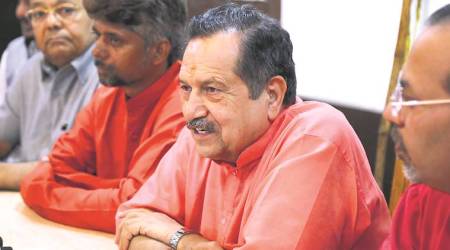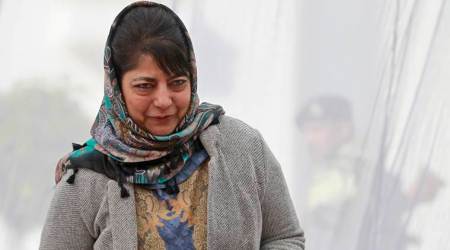 J&K CM Mehbooba Mufti and National Conference leader Farooq Abdullah
J&K CM Mehbooba Mufti and National Conference leader Farooq Abdullah
Sensing what she called a serious threat to the special status of Jammu and Kashmir, Chief Minister Mehbooba Mufti Tuesday drove to the Gupkar residence of her arch political rival National Conference leader Farooq Abdullah to seek his support to prevent the dilution or abrogation of Article 35 A by the Centre.
This is for the first time that the two rivals have come together to make a common cause on any issue, underlining how protection of J&K’s special status has become an existential issue for the two largest mainstream political parties in the state. Speaking to The Indian Express soon after the meeting, Mufti said: “Dr Abdullah Sahib is the seniormost leader of our state and I went to him to seek his guidance and support on the issue of special status of our state which is under serious threat”. She said that Chief Minister Omar Abdullah was also there.
“It is a challenge for all political parties in J&K, who swear by the J&K Constitution and the Constitution of India. There is hardly anything left in our special status and if Article 35 A is tampered with, we will cease to exist. It will be a death knell to the mainstream here. We will have nothing to tell our people,’’ she said.
“We are all together in this,” she added. She said she had a detailed talk with the Abdullahs. “I requested him (Farooq) to raise this issue with the leaders in Delhi as well,’’ she said. Subsequently, she said, she also had a meeting with the J&K Pradesh Congress Committee chief G A Mir. “I am planning to talk to other leaders and political parties tomorrow to build a consensus on how to protect our special status. I am also calling an all-party meeting soon,’’ she said.
Former Chief Minister Omar Abdullah told The Indian Express that “Chief Minster had called on Dr Sahib this evening to discuss the prevailing political situation especially the ways to protect Article 35 A which is the cornerstone of our special status”. “We agreed on the need to create a wider consensus among parties to fight this battle together. We cannot afford to have Art 35 A removed,’’ he said. “We think it is an urgent situation and we need to take immediate steps to prevent it because there will be nothing left if we wait,’’ he said. Calling today’s meeting an “important beginning,” Omar said: “We told the CM that she would need to ask her coalition partner to desist from going on this path which will be disastrous for us all. Dr Sahib also suggested that the CM must talk to other like-minded political parties too so that there is broader solidarity on the issue.’’
Saying that there was an “urgent need” to immediately reach out to all the regions (of J&K), Omar said: “We need to explain what is at stake for all of us. We are all together in it and if the special status is tampered with, it will seriously harm every citizen of the state,’’ he said.
Speaking to The Indian Express, senior PDP leader and PWD Minister Naeem Akhtar said that there was a “consensus” at the meeting that any attempt to “weaken them (Article 370 and Article 35 A) would weaken the relationship between the state and India and it would also be against the national interest”.
Article 35 A is a provision of the Constitution that empowered the J&K Constitution to define “permanent residents” of the state. It was added to the Constitution through “Constitution (Application to Jammu and Kashmir) Order, 1954,” issued by the President under Article 370. The PR law replicated a state subject law promulgated by Dogra king Maharaja Hari Singh in 1927 following a strong campaign by Kashmiri Pandits who were opposed to the hiring of civil servants from Punjab because it had affected their representation in the Dogra administration.
The J&K Constitution, adopted on November 17, 1956, defined a PR as a person who was a state subject on May 14, 1954, or who had been a resident of the state for 10 years and has “lawfully acquired immovable property in the state”. The J&K legislature could alter the definition of PR through a law passed by a two-thirds majority.
In 2014, an NGO ‘We the Citizens’ filed a writ petition seeking the striking down of Article 35 A. While the J&K government filed a counter-affidavit, the Centre did not — despite pleas from the state government, especially the PDP. Last month, Attorney General K K Venugopal told SC that it “raised Constitutional issues” after which the court referred the matter to a three-judge bench and set six weeks for final disposal, leading to an uproar in Kashmir.
Earlier speaking at a rally in Budgam, Mufti said: “If a law in passed, it is not abiding on us. We can pass it when we like it. Isn’t this our power? We have our own flag. Isn’t that out power? We have power to make our own laws. Nobody from outside can buy land in our state. Isn’t this our power?,” she said in her address.







